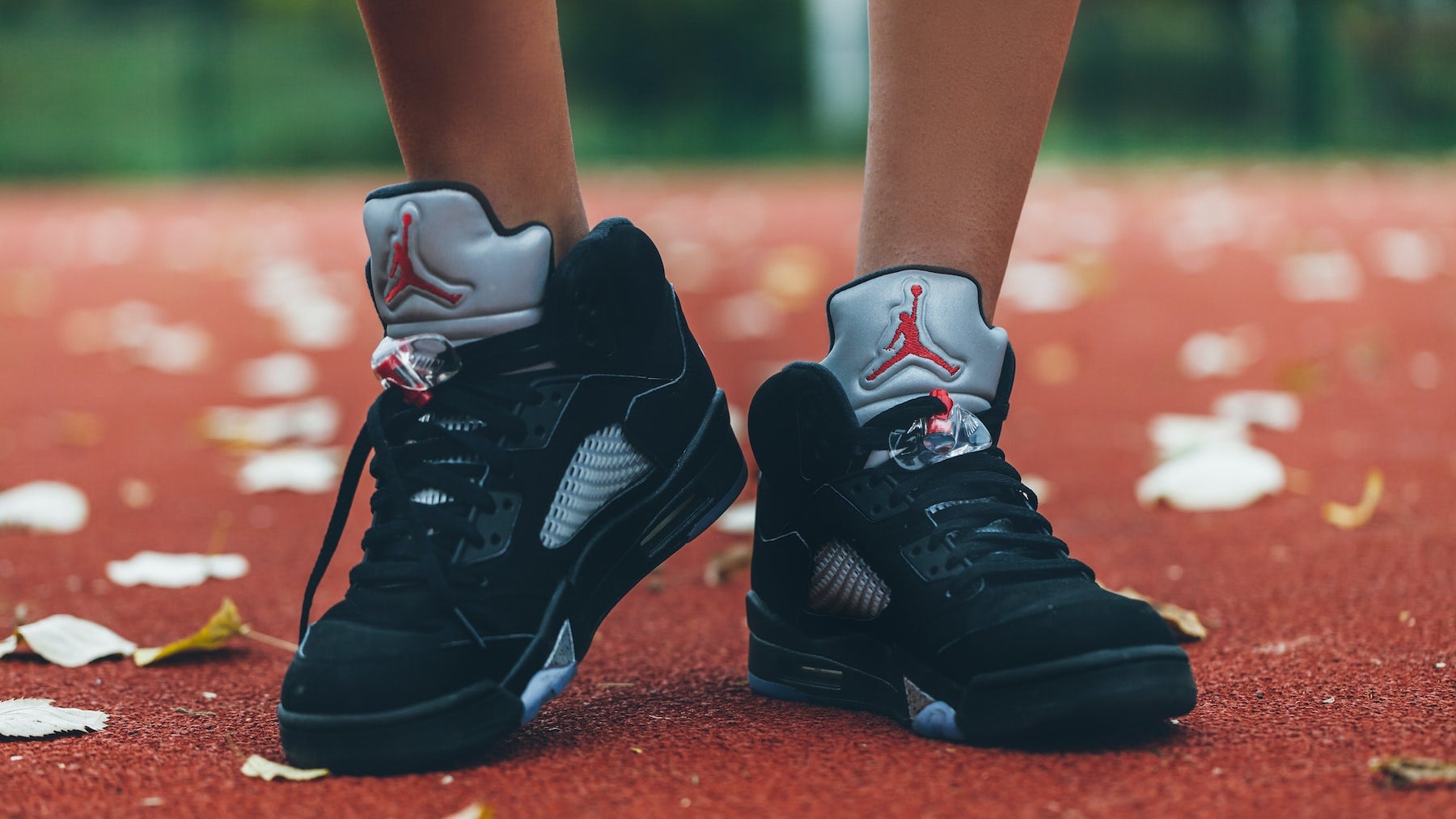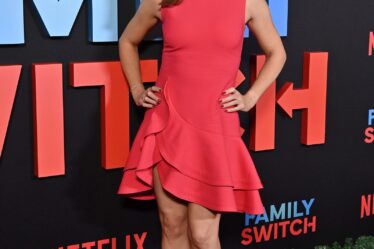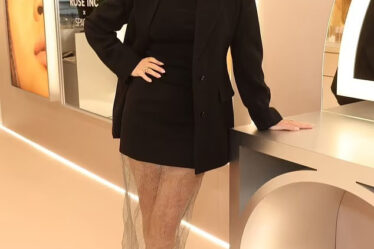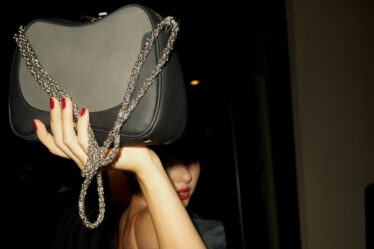
Cashmere ponchos, lambskin bras and $1,000 Air Jordans. A 1,000-square meter retail homage to Michael Jordan in Beijing’s trendiest neighbourhood. Affiliations with China’s domestic basketball elite and limited-edition Jordan collabs with local street artists.
These are the highlights of a new push for the Jordan brand in China, one that Nike Inc. hopes will lay the foundation of a permanent comeback there. Beyond the significant economic slowdown that’s sapped sales for all the big brands, Nike’s been buffeted by rising consumer nationalism — a trend fuelled by legitimately hot products from local brands like Li Ning Co. and Anta Sports Products Ltd.
At its peak in 2021, the Greater China region accounted for almost one-fifth of Nike’s total global sales. It now accounts for less than 15 percent, compounding a difficult year for the company. Layoffs have hit headquarters and investors are concerned about weakening demand for Nike sneakers and sportswear. Shares are down 11 percent so far this year and management has warned that sales will fall over the next six months.
As a testament to how badly Nike needs to reinvigorate its business in China, and to its conviction that Jordan is the way to do it, the company chose Beijing for its fourth global outpost of the Jordan-specific World of Flight, well ahead of the US debut planned for Philadelphia. The night before the store opened to the public in March, local basketball stars slipped in for a VIP reception. Chinese rapper Asen performed on an outdoor stage for a raucous crowd.
Sarah Mensah, president of the Jordan Brand, flew from Nike’s Oregon headquarters for the event. Sitting on one of the leather couches in the store’s upstairs lounge, Jordan artwork and memorabilia on the walls around her, she pointed out the workshop area, where shoppers can personalise products with embossings, engravings and patches.
“Our consumer really expects us to tell unique, distinct, often hyper-local oriented stories,” she said. “They want authenticity, and they want to see themselves reflected, particularly the consumer here in China.”
To that end, the World of Flight in Beijing will serve as a sort of laboratory, a new opportunity for company executives to observe customer behavior and gather data, to find clues to success that parent Nike may have missed.
“It’s an important strategy for Nike to lean more on its trendy luxury brand Jordan to embrace young consumers and gain higher growth,” said Blair Zhang, a Shanghai-based senior luxury and fashion analyst with Mintel, a market research firm. “Its challenge lies in how to lure the young generation and the high-income shoppers to keep spending on the brand.”
Jordan’s China campaigns now feature domestic stars like Guo Ailun, point guard for the Liaoning Flying Leopards, winners of the last three Chinese Basketball Association titles. The brand is also a title sponsor of Next Stop Dongdan this summer, a streetball tournament played on a Beijing court that’s China’s version of New York’s Rucker Park. For the store in Beijing, the brand will work with local street artists to create limited-edition shirts and hoodies; Jordan is set to release five new limited edition sneakers next spring.
Two-thirds of consumers surveyed by Mintel say the availability of limited editions make them more likely to go shopping. That’s especially true in high-income families.
Local flavor is pitched at consumers eager to support homegrown brands — and less tolerant of Western ones. Nike enraged Chinese shoppers in 2021 with its announcement that it would no longer use cotton from Xinjiang because of persistent allegations of labor abuses against the area’s Uyghur population. The Chinese government has consistently denied those charges, and mainland consumers launched a de facto boycott. (Adidas AG took the same position, and its China sales also suffered.) Within a year, Nike fell to third place, behind Chinese labels Li Ning and Anta.
Nike is back on top now, but the outrage dealt a blow to the company’s market share as some Chinese consumers switched to the local brands and never looked back. No longer second-rate copycats, Chinese products are now both fashionable enough for patriotic sneakerheads and good enough for the world’s best players. Several NBA players wear Li-Nings, and this season’s playoffs were particularly good to Anta, the shoe of choice for Kyrie Irving since Nike cut ties with the Dallas Mavericks star in 2022.
The Jordan brand, though, has proven more resilient than its parent. It has about one-third of the market share that Nike has in China, a greater proportion than in many other markets, according to data from market research firm Zhiyi Tech, which monitors sales data on the country’s major e-commerce platform Tmall. And while its share has ticked down slightly since 2021, it never suffered Nike’s precipitous drop.
“In China, Jordan has a group of loyal consumers who have experienced Michael Jordan’s era — they are mostly 40 years old or above, with strong spending power,” said Ari Chen, general manager of Jordan in Greater China. “The consumers here are very sophisticated.”
China got its first introduction to Michael Jordan at the 1984 Olympics. Fresh off the NBA draft, the 6-foot-6 guard from the University of North Carolina led the US to 48-point win over Team China, kicking off a gold-medal run that captivated a global audience. Three months later, Jordan signed an unprecedented endorsement deal with Nike that awarded the rookie a percentage of sales, cementing his status as a player off the court as well.
In the 15 years following, no one was more responsible than Jordan for basketball’s global rise. CCTV began airing playoff games during his dynastic run with the Chicago Bulls, which Chinese fans called the Red Oxen. In 1997, Nike started selling Air Jordans in China. A year later, a poll from Beijing Meilande Information Co. ranked Jordan as the second-most famous American behind Thomas Edison, who’d been dead for almost 70 years.
So maybe it was only a matter of time before a local Chinese shoe company renamed itself Qiaodan, a transliterated version of Jordan. The company had already sold Jordan-esque shoes and No. 23 jerseys; its logo featured a silhouetted basketball player in motion. In a market already rife with counterfeits and knock-offs, Qiaodan’s sales soared.
Even after Jordan stepped away from basketball in the early 2000s, his brand had staying power, and his continued popularity buoyed the Chinese copycat too. By 2012, when Jordan filed a trademark infringement lawsuit in Shanghai, Qiaodan was pondering a domestic IPO.
The case spent years in the Chinese legal system before the court ruled in Jordan’s favour. Qiaodan had to apologise and clarify that its brand is unrelated to Jordan’s, but it was allowed to stay in business, keep its name and use its older trademarks. And in those intervening years, Qiaodan, like other domestic shoe companies, found its own style and fans.
In 2022 it signed a deal with an NBA player, San Antonio Spurs forward Keldon Johnson, who now wears the brand on the court. The shoes have a patch on the side bearing Johnson’s full name, nothing a seasoned sneakerhead would mistake for the Jordan brand’s Jumpman logo, but whether anyone is confused by the name or affiliation anymore is almost beside the point. Today Jordan has about 5 percent market share in China, according to Zhiyi Tech data. Qiaodan sits just behind it, with 4.3 percent.
Even as Nike embarks on a three-year plan to trim as much as $2 billion in global costs, including job cuts that will slash 2 percent of the company’s workforce, Jordan is getting more resources. Chief executive officer John Donahoe said in an internal memo in February that the Jordan brand will play a key role in the revival effort. Nike is divesting in “less critical work,” he said, to make room for areas that matter most.
“The Jordan brand is one of Nike Inc.’s growth drivers moving forward,” said Mensah. “We’re mindful of the importance of our role.”
Apparel now accounts for about 15 percent of Jordan’s annual sales worldwide, or about $1 billion. Products include knit dresses and fleece pants along with sports bras and workout shorts. There are even red No. 23 dresses for toddlers. Mensah says it will be crucial to grow the apparel business and get new products to store shelves faster.
Management is also looking at sports beyond basketball. Jordan, an avid golfer, is working closely with executives on building out that part of the business, which sells spikes, clothes, gloves and bags.
As for the famous sneakers, 21-year-old Orlando Magic forward Paolo Banchero debuted the 39th iteration of Air Jordans during the first round of the NBA playoffs. His white-on-white version will be available in July for $200 online and at World of Flight outposts — in Milan, Tokyo, Seoul and now Beijing — among other outlets.
None of Nike’s efforts in China will succeed, though, if consumers there don’t open their wallets. A housing crisis is dragging on the economy, and spending is anemic. That’s especially true at the high end. Bain & Co. estimates that luxury sales within the country will slow to mid-single-digit growth this year, down from 12 percent in 2023. For mass-luxury labels like Marc Jacobs and Ralph Lauren, returns and order cancellations spiked significantly during the first quarter of this year, according to data from Tmall.
“I don’t think any brand’s continued growth in China is guaranteed, particularly with softening consumer spending,” said Mark Tanner, managing director at marketing agency China Skinny. “But the brands and categories that are faring the best are those who are connecting emotionally,” he added. “And Jordan has done that well with both product and its subcultural positioning.”
The day World of Flight opened in Beijing, dozens of shoppers hovered outside long before the doors unlocked. Among this group of die-hards, the new luxury lineup was the big draw.
Cocoa Li, 23, took a three-hour flight from Shenzhen for the opening. He wears Jordans and resells them online on social media sites like Xiaohongshu and Taobao. He budgeted about 50,000 yuan ($6,900) for the occasion, planning to simultaneously nab inventory to resell and splurge for himself. “It’s nothing to wait a few hours,” he said. “Everything will be worth it if you find something really cool.”
By Bloomberg News



